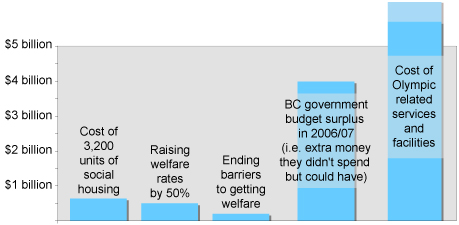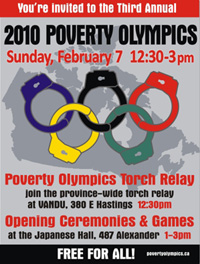Land of Plenty
Until the recession began last year, British Columbia and Canada had big surpluses and could have seriously reduced poverty and homelessness without going into more debt.
Now we are in a recession and economists agree that one necessary action to prevent further job loss is for governments to spend money, especially money that will circulate back into the economy quickly. We can afford to end poverty and homelessness. Studies have shown that it’s cheaper to end homelessness than to maintain it. And poverty reduction would also reduce government costs for health, education and justice.
Poverty Olympics organizers want our governments to act now!
The BC (provincial) government should:
- Increase welfare rates by 50%, and index welfare to inflation, so rates go up when the cost of living does.
- Get rid of arbitrary barriers that stop people from getting welfare when they need it.
- Stop clawing back money from welfare recipients when they get child support payments or earn small amounts from part-time work.
- Build 2,000 new units of non-market housing per year, in addition to assisted living (for low-income seniors and people with disabilities or mental illnesses) and emergency shelters.
- Increase the minimum wage to $10 per hour, and index it to inflation — this would mean a single person working full time could earn a little more than the poverty line.
The Canadian (federal) government should:
- Set national standards for welfare, to make sure every Canadian can get help during hard times (it used to do this).
- Create and fund a national housing and homelessness strategy (BC has the highest poverty rate in Canada, but these are problems in other provinces too).
The Vancouver (municipal) government should:
- Scrap its so-called “Civil City” initiative — which is really just code for cracking down on poor people who have no choice but to beg, steal or sell sex to survive.
- Put a moratorium on the conversion and closure of residential hotels that are the home to about 5000 low income residents.
- Ensure that new development in Vancouver’s Downtown Eastside includes non-market housing.
- Pressure the provincial and federal governments to do their part.
Sounds expensive? Have a look at the numbers:
Annual cost of homelessness per homeless person with addiction or mental illness: $55,000
(Source: The Time Is Now: A Poverty Reduction Plan for BC, CCPA, December 2008)
Amount province could SAVE per year if it built housing and provided supports for homeless people: $33 million
(Source: The cost of homelessness by Lori Culbert, Vancouver Sun, March 22, 2008).
Check out the Poverty Olympics Social Index
Benefit of reducing poverty: priceless

Cost of reducing poverty
(as recommended in the Inner-City Inclusive Housing Table report)
| Building 3200 units of housing | $640 million |
| Raising welfare 50% | $500 million |
| Ending welfare barriers | $200 million |
| Total | $1.34 billion |
Government surpluses
| 2006/07 | 2007/08 | |
| Federal government | $14 billion | $10.2 billion |
| Provincial government | $4 billion | $2.9 billion |
Cost of Olympic-related services and facilities
| Venues | $600 million |
| Program spending | $125 million |
| Security | $400 million – $1 billion |
| 2 Olympic Villages | $1.261 billion |
| Sea to Sky Highway | $775 million |
| Trade and Convention Centre | $883 million |
| RAV line | $2 billion |
| Total | $6.044 to $6.644 billion |
How $6 billion could reduce poverty and homelessness
| Raise welfare by 50% for 5 years | $2.5B |
| End the barriers that keep people in need from getting welfare for 5 years | $1B |
| AND build 12,720 new units of good social housing | $2.5B |
| PLUS raise minimum wage (0 cost to taxpayers!) |
Cost of Olympic Venues
| Venue | Cost | Housing units |
| UBC Ice Hockey | $47 million | 235 |
| Training venues | $20 million | 100 |
| Hastings Skating | $25 million | 125 |
| Hillcrest Curling | $37 million | 185 |
| Skating Oval | $178 million | 890 |
| Cypress Freestyle | $15 million | 60 |
| Whistler Alpine | $26 million | 130 |
| Whistler Nordic | $112 million | 560 |
| Sliding Centre | $100 million | 500 |
– – – – –
Links:
The Clock is Ticking: Funding the Inner-City Inclusive Housing report
by Marc Lee, Canadian Centre for Policy Alternatives
Cracks in the Foundation: Solving the Housing Crisis in Canada’s Poorest Neighbourhood, Pivot Legal Society
10 ways we can improve the lives of low-income Britsh Columbians, by Seth Klein, Canadian Centre for Policy Alternatives
What’s missing from the “housing” budget? The housing. By Marc Lee, Canadian Centre for Policy Alternatives
